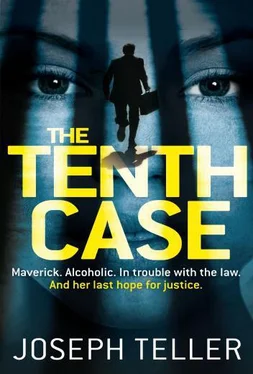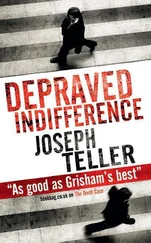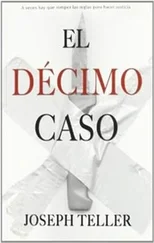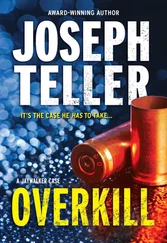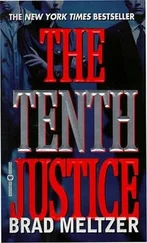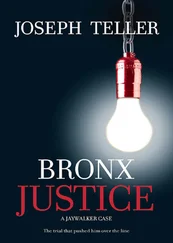Joseph Teller - The Tenth Case
Здесь есть возможность читать онлайн «Joseph Teller - The Tenth Case» — ознакомительный отрывок электронной книги совершенно бесплатно, а после прочтения отрывка купить полную версию. В некоторых случаях можно слушать аудио, скачать через торрент в формате fb2 и присутствует краткое содержание. Жанр: Криминальный детектив, на английском языке. Описание произведения, (предисловие) а так же отзывы посетителей доступны на портале библиотеки ЛибКат.
- Название:The Tenth Case
- Автор:
- Жанр:
- Год:неизвестен
- ISBN:нет данных
- Рейтинг книги:3 / 5. Голосов: 1
-
Избранное:Добавить в избранное
- Отзывы:
-
Ваша оценка:
- 60
- 1
- 2
- 3
- 4
- 5
The Tenth Case: краткое содержание, описание и аннотация
Предлагаем к чтению аннотацию, описание, краткое содержание или предисловие (зависит от того, что написал сам автор книги «The Tenth Case»). Если вы не нашли необходимую информацию о книге — напишите в комментариях, мы постараемся отыскать её.
The Tenth Case — читать онлайн ознакомительный отрывок
Ниже представлен текст книги, разбитый по страницам. Система сохранения места последней прочитанной страницы, позволяет с удобством читать онлайн бесплатно книгу «The Tenth Case», без необходимости каждый раз заново искать на чём Вы остановились. Поставьте закладку, и сможете в любой момент перейти на страницу, на которой закончили чтение.
Интервал:
Закладка:
Jaywalker stood up, feigning shock and surprise. "My client has made herself available to the court without fail," he pointed out. "She wears a bracelet around her ankle. It contains a GPS transponder that tells the corrections department and the district attorney's office where she is at any given moment, within sixteen feet, I believe it is. Should she cut it off, an electronic signal would go out in a fraction of a second, allowing law enforcement to liter ally beat her to the airport by an hour. Considering all-"
Judge Sobel held up one hand. Here it comes, thought Jaywalker, the extreme likelihood of a conviction, coupled with the Indiana warrant, when weighed against the rela tively minimal inconvenience to the defendant of a weekend spent on Rikers Island.
"I'm satisfied that the present bail conditions are suffi cient to insure the defendant's return to court," said the judge. "Should she be so foolish as to prove me wrong, the law gives me extremely wide latitude at the time of sen tencing. Do I make myself clear, Mrs. Tannenbaum?"
"Yes, Your Honor."
"Have a good weekend, everyone."
Jaywalker found himself standing there like an idiot, re alizing for the first time that he'd been on the verge of tears. He managed to nod in the judge's direction and silently mouth the words, "Thank you." He didn't dare try to say anything out loud.
28
Jaywalker was by nature a procrastinator. He'd realized it early on in school, when he'd found it all but impossible to tackle a homework assignment, however mundane and simple, until the last conceivable moment. "Don't worry, I'll do it," he'd explained on one occasion to his father, a stickler for advance preparation. "It's just that I work better under pressure."
He'd been five at the time.
That said, Jaywalker had been working on summing up in Samara's case, in one way or another, for a year and a half now. If that sounds like an exaggeration, it isn't. As soon as Jaywalker got a case-and he'd gotten Samara's a year ago August-he began to think of it in terms of an argument, a debate. What facts were beyond contesting? What others were less certain, but still worth conceding in the name of gaining credibility with the jury? And what one or two issues did that leave to go to war over? Then he would print the word SUMMATION at the top of a sheet of paper, jot down some preliminary thoughts and place the page in a folder bearing the same title. As his investigation of the case progressed over time, he would add to the folder, a word here, an idea there, even a bit of specific language that he felt might resonate with a jury someday. Over the months that followed, the folder would gradually grow thick with additions, revisions and modifications, until it contained, in rough form, just about everything that would go into his summation. About all that remained was for the trial itself to unfold and reveal just how closely the actual testimony would track Jaywalker's expectations. Sometimes there were a few surprises, necessitating minor modifications. More often, there weren't. If you worked hard enough before a trial, not only were you ready for what took place, you actually dictated what took place, caused it to unfold precisely the way you'd planned.
Samara's case had been different.
Samara's case, from the very beginning, had defied all the rules. In one sense, the facts were barely in dispute. Someone who'd been at Barry Tannenbaum's apartment had taken a knife and plunged it into his chest, causing his death. Samara had been there at the time it had happened, or pretty close to it. The two of them had been heard argu ing loudly, and she'd left minutes afterward. Confronted by detectives the following day, she'd lied about having been there, and about whether or not she'd argued with Barry. A search of her apartment had revealed a knife con sistent in all ways with the murder weapon, a blouse she admitted owning and a towel. All three items had Barry's blood on them.
It only got worse from there.
Samara, who'd knowingly signed a prenuptial agree ment leaving her with nothing were she to divorce Barry, also believed she could be disinherited by him under the terms of his will. And as far as she knew, her husband had no life insurance. Barry was in poor health, with cancer and heart disease. Although she denied knowing about the cancer, she acknowledged that Barry was obsessed with his health and fearful he was dying. A month before he actually did, she'd signed her name to an application for a twentyfive-million-dollar policy on his life. For it to pay off, Barry would have had to die within six months, though not of heart disease or cancer.
Nobody other than Samara appeared to have been in Barry's apartment around the time he was murdered. No one but she had been in the home where the knife, the blouse and the towel were subsequently found.
And now, to top things off, it turned out that once before in her life, Samara had taken a knife and stabbed a man in the chest. Although, by the grace of God or the fortuitous intervention of a couple of millimeters of human tissue, the difference depending upon one's particular set of beliefs, that earlier victim had managed to survive.
The problem with Samara's case was that absolutely ev erything was beyond contesting. Everything, that was, except whether it had been Samara or somebody else who'd murdered Barry. Early on in the trial, Jaywalker had told the jurors that it had been somebody else. He'd even hinted at four possible suspects. But one by one, the testimony had cleared them. Anthony Mazzini, the super, might have milled around Barry's apartment after letting the detectives in, but other than that he was above suspi cion. Kenneth Redding, the co-op board president, had had a minor disagreement with Barry but hardly a reason to kill him. Alan Manheim, the recently fired lawyer, might or might not have stolen a lot of money from Barry, but he was fully prepared to defend himself. And William Smythe, Barry's accountant, had come off on the witness stand as a straight shooter. More to the point, none of those individuals, not one of them, had had access to Samara's town house. Even if one of them, or all of them acting together, had murdered Barry, there was still no way they could have gotten the knife, the blouse and the towel into Samara's place.
So who did that leave? The detectives? At least they would have had the opportunity to plant the evidence, assuming they'd wanted to. But why? Well, it went some thing like this. A murder's been committed. Who do the police immediately suspect? The husband or wife, boy friend or girlfriend, that's who. Why? Well, the police would have us think it's because statistics show that some one close to the victim is most often the guilty party. But those statistics are fatally skewed from the outset. Once the authorities fix on a suspect, abuses immediately begin to creep into the process. Other possible suspects are allowed to disappear entirely or fade from consideration, to be re membered only twelve or fifteen years later, when some newly tested piece of DNA evidence walks someone out of prison. But in the moment, all attention gets focused on the person closest to the victim. Careless statements made by that person, minor inconsistencies in his or her story, and anything short of an airtight alibi, soon turn the police's suspicion into certainty. A confession follows. Never mind whether it happens to be full or partial, consistent with the facts or at odds with them, true or false. An arrest is made, a favorite reporter is alerted, and a perp walk is arranged. That afternoon, just in time for the evening news, the police commissioner holds a triumphant press conference. The media eat it up and spit it out, and a public on the verge of panic is assured it can rest easy. The murder, it turns out, was nothing but a domestic squabble gone bad. No random killer remains at large, walking their streets and stalking their loved ones.
Читать дальшеИнтервал:
Закладка:
Похожие книги на «The Tenth Case»
Представляем Вашему вниманию похожие книги на «The Tenth Case» списком для выбора. Мы отобрали схожую по названию и смыслу литературу в надежде предоставить читателям больше вариантов отыскать новые, интересные, ещё непрочитанные произведения.
Обсуждение, отзывы о книге «The Tenth Case» и просто собственные мнения читателей. Оставьте ваши комментарии, напишите, что Вы думаете о произведении, его смысле или главных героях. Укажите что конкретно понравилось, а что нет, и почему Вы так считаете.
